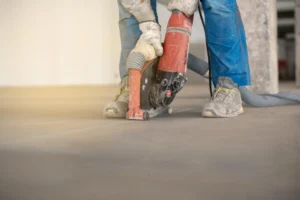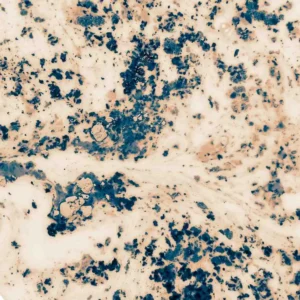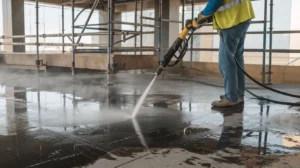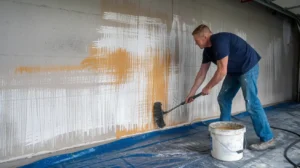Can you use bleach on marble? While bleach is a potent cleaning agent commonly used for disinfecting and removing tough stains, it’s essential to exercise caution when considering its application on marble surfaces. Marble, a delicate natural stone prized for its beauty and elegance, can be susceptible to damage from harsh chemicals like bleach.
The high acidity of bleach can etch the surface of marble, leading to dullness, discoloration, and even erosion of the stone over time. Therefore, it’s generally advisable to avoid using bleach on marble surfaces to preserve their pristine appearance and longevity.
Composition and Characteristics of Marble
Composition and Characteristics of Marble:
Marble is a metamorphic rock composed primarily of calcite or dolomite minerals. It forms when limestone is subjected to high temperatures and pressures over time, causing its recrystallization into a harder, denser material.
Marble typically exhibits a range of colors and veining patterns, depending on the minerals present and the geological processes involved in its formation. It is renowned for its aesthetic appeal and has been used for centuries in sculptures, architecture, and decorative elements due to its beauty and workability.
Sensitivity to Harsh Chemicals:
Marble is relatively sensitive to harsh chemicals and acidic substances. Acids, such as those found in citrus fruits, vinegar, and certain cleaning products, can etch the surface of marble, dulling its shine and damaging its appearance.
Similarly, abrasive cleaners and scouring pads can scratch the surface of marble, detracting from its smooth finish. It’s essential to avoid using these substances on marble surfaces to maintain their beauty and integrity.
Importance of Proper Maintenance:
Proper maintenance is crucial for preserving the beauty and longevity of marble surfaces. This includes regular cleaning with gentle, pH-neutral cleaners specifically formulated for use on marble. Spills should be promptly wiped up to prevent staining, and coasters or mats should be used under glasses and other potentially acidic or abrasive items.
Additionally, marble surfaces may benefit from periodic sealing to help protect against stains and etching. With proper care and maintenance, marble can retain its natural elegance and charm for generations to come.
Can You Use Bleach on Marble?

Using bleach on marble can be risky due to potential damage to the surface, discoloration and staining, and weakening of the stone. Factors to consider include the concentration of bleach, duration of exposure, and type of marble.
Risks and Concerns:
Damage to the Surface: Bleach is a strong chemical that can etch or dull the surface of marble, causing permanent damage.
Discoloration and Staining: Bleach may react with minerals in the marble, leading to discoloration or staining that is difficult to remove.
Weakening of the Stone: Prolonged exposure to bleach can weaken the structure of the marble, making it more prone to cracking or breaking.
Factors to Consider:
Concentration of Bleach: Higher concentrations of bleach are more likely to cause damage to marble. Diluting bleach with water can help reduce its strength.
Duration of Exposure: Leaving bleach on marble for an extended period increases the risk of damage. It’s important to rinse the surface thoroughly after cleaning.
Type of Marble: Some types of marble are more resistant to chemicals than others. Testing bleach on a small, inconspicuous area before using it on the entire surface is recommended.
Alternatives to Bleach:
pH-neutral cleaners: Use cleaners specifically designed for marble that have a neutral pH to avoid damaging the stone.
Mild soap and water: For routine cleaning, a solution of mild soap and water can effectively clean marble without causing harm.
Poultice: For stubborn stains, a poultice made from absorbent materials and a gentle cleaning agent can be applied to draw out the stain without damaging the marble.
Overall, it’s best to proceed with caution when considering using bleach on marble surfaces and to explore safer alternatives for cleaning and maintenance.
Can You Use Bleach on Marble Tiles and Floors?
Specific Challenges for Tiles and Floors:
Damage to Surface: Bleach is a highly corrosive substance that can etch and dull the surface of marble, leading to permanent damage.
Staining: Marble is porous, so bleach can penetrate the surface and cause staining, discoloration, or blotches.
Weakening of Structure: Continuous use of bleach weakens the structure of marble, making it more prone to cracks and chips over time.
Best Practices for Cleaning Marble:
Gentle Cleaning Solutions: Opt for mild, gentle cleaning solutions specifically formulated for marble surfaces. Avoid harsh chemicals like bleach.
pH-Neutral Cleaners: Use pH-neutral cleaners that are safe for marble. These cleaners effectively remove dirt and grime without causing damage.
Soft Brushes or Cloths: When cleaning marble, use soft-bristled brushes or non-abrasive cloths to avoid scratching the surface. For professional guidance get in touch with Stone Sealer Restoration.
Bleach on Marble Shower
Unique Considerations for Marble Showers:
Marble is a beautiful and luxurious material often used in showers, but it requires special care to maintain its appearance and structural integrity. Unlike other materials, marble is sensitive to acidic substances and harsh chemicals, making it important to choose cleaning products carefully.
Risks of Using Bleach:
Using bleach on marble showers can pose several risks. Bleach is a highly corrosive substance that can damage the surface of marble, causing etching or discoloration. Additionally, bleach can react with minerals in the marble, leading to further damage over time. Its strong fumes can also be harmful if inhaled, making it unsafe for use in poorly ventilated areas like bathrooms.
Safe Cleaning Practices:
Mild Soaps:
Opt for gentle, pH-neutral soaps specifically formulated for use on marble surfaces. These will effectively clean the marble without causing any damage.
Regular Maintenance:
Regularly clean your marble shower with a soft cloth or sponge and mild soap to remove dirt and grime. Avoid using abrasive scrubbing pads or harsh chemicals that could scratch or etch the surface.
Proper Ventilation:
Ensure proper ventilation in your bathroom when cleaning or using any cleaning products. Open windows or turn on exhaust fans to allow fresh air to circulate and prevent the buildup of harmful fumes.
Conclusion
The risks associated with using bleach on marble surfaces are significant and should not be overlooked. Bleach, being a highly reactive chemical, can cause irreversible damage to marble by etching its surface, leading to discoloration and loss of shine.
Additionally, bleach can react with minerals present in marble, resulting in unsightly stains and blemishes. Moreover, prolonged exposure to bleach can weaken the structural integrity of marble, making it more prone to cracking and chipping over time. Feel free to contact us for any type of services or query like can you use bleach on marble.
FAQs
Can Bleach Be Used To Clean Marble Countertops?
Bleach should not be used to clean marble countertops. Bleach is highly acidic and can cause etching or discoloration on the surface of marble.
What Happens If Bleach Comes Into Contact With Marble?
Bleach can cause irreversible damage to marble surfaces. It can lead to dullness, etching, or even create noticeable stains on the marble.
Are There Alternative Cleaning Methods For Marble?
Yes, there are several safe alternatives for cleaning marble surfaces. These include using mild dish soap mixed with warm water, specialised marble cleaners, or a solution of water and vinegar. Always test any cleaning solution on a small, inconspicuous area before applying it to the entire surface.
Can Bleach Be Used On Marble Floors?
It is strongly advised against using bleach on marble floors. Similar to countertops, bleach can damage the marble, leading to permanent discoloration or etching.
How Should I Clean Marble Surfaces Effectively?
To clean marble surfaces effectively, use a soft cloth or sponge dampened with a mild cleaning solution. Gently wipe the surface and avoid using abrasive cleaners or materials that could scratch the marble.
Can Bleach Be Diluted To Make It Safe For Marble?
Diluting bleach with water does not make it safe for use on marble. Even diluted bleach can still cause damage to the marble surface.





